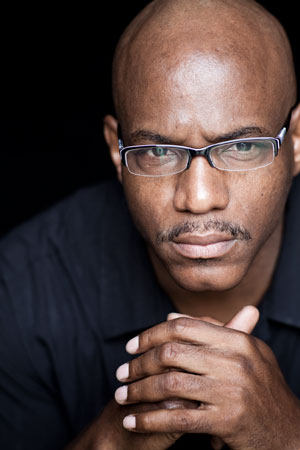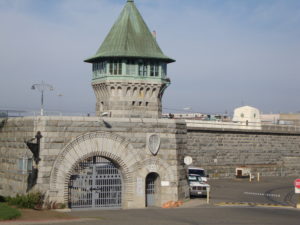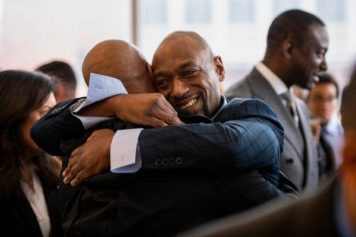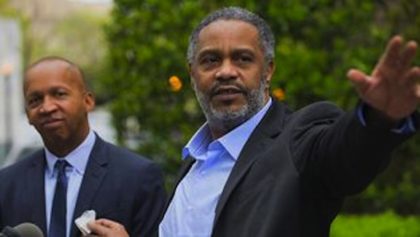
Herman Atkins spent 12 years in some of California’s most notorious prisons for a rape he did not commit. He was exonerated in 2000 when DNA evidence proved what he had said all along. He spends his days now in law school in San Diego, working to become an attorney to represent the disenfranchised who are arrested under questionable circumstances.
Atkins tells his emotional and heart-wrenching story in a three-part series to Atlanta Blackstar.
Part II: The Insanity of Hope, by Herman Atkins
(as told to Curtis Bunn)
After the conviction and a few months in the Riverdale County jail, I was sent 20 miles north of Sacramento, to Old Folsom State Prison, which opened in 1880, making it the second-oldest penitentiary in California behind the infamous San Quentin. It was no place to call home.
In fact, I got chills just riding up to the front of the facility on the bus. Even from the outside it looked like some place you did not want to be. There was a massive gray brick wall that seemed to stretch 50 feet up. Beyond it was a guard tower laced in the same dreary brick, with the top of it pointed, like a castle or witch’s hat.
And the sky was equally gray, making it dark and gloomy. The only thing missing was a thunderbolt in the background. It was that creepy.
They lined us up in our orange jump suits outside the prison, side-by-side on this December morning in 1988 for about 40 minutes, and even the most hardened criminal shivered from cold and fear. It looked like a place you go in and never leave.
It was there that I lost all hope of ever being a free man again. That’s worth repeating: I lost all hope of ever being a free man again.
It would have been crazy for me to believe that someone would care enough to look into my case, to think I could ever walk, unshackled, out of prison gates. My sentence—45 years, eight months—was not a life sentence. But in my mind, it amounted to a death sentence.
And here’s why: After about 30 days at Old Folsom, I was coming back with other inmates from the infirmary. As we walked toward my cell, I could hear a couple of men wrestling with each other and one man yelling. He wasn’t yelling, “Help, help.” It was more like, “Stop. No. Please don’t do this”—loud enough for us to hear.
His pleas got louder the more we walked. Finally, I arrived at the scene that changed my world:
A man was being raped.
I saw it through a glance and my peripheral vision; you do not stop and stare in prison. But I witnessed enough to have my entire foundation rocked. Before that moment, there was something in me that dreamed of freedom. Not after that.
In the 12 steps from the scene of that rape to my cell—which took no more than 15 seconds—I gave up all hope of ever leaving prison as a free man. Hope was gone, abolished, imploded, vaporized.
It took me only 12 steps in 15 seconds to realize my fate, and a coldness came over me. There was a cross between being frightened and brave. I decided in those dozen paces that I would protect my manhood at any cost.
In those 12 steps, I let go of the outside world. I made a conscious decision to focus on the world I was in. I didn’t care anymore. I would put my life on the line to protect my manhood. That incident showed me what I had heard about and read about and feared. To witness it jolted me. They were no joke about taking what they wanted. You were either going to be taken advantage of or you were going to commit to protecting yourself by any means necessary.
And that meant adding more time on your sentence for fighting or even killing someone trying to violate you. That’s why I knew right then that my life was over as it related to the free world.
In a way, it was like your son needing a kidney or heart or some other vital organ. You think: “I’ve lived enough. I want my son to live his life.” And you give up that kidney or organ, knowing your health will deteriorate. But you do anything to protect your bloodlines. You have to be a hell of an individual to do that.
It is a hell of a thing to admit to yourself that you will never walk the earth a free man again. And when you add that you did not belong in prison in the first place, it was more gut-wrenching, even now.
But to survive I had to abandon all hope. Hope was a convenience I could not afford. Free people with troubles, in most cases, had mental avenues to embrace that there will be a better day. If I were to do that in prison, I would have been devoured.
I had two conflicting emotions—fear and bravery—that came together to create a force that kept me from suffering the worse horrors a man could endure.
I was so afraid that I became braver than I had ever been. That might sound strange, but it’s true. I was so scared of what could happen to me that I became more daring in what I would do to protect myself.
This was the world I was in, a world I was convinced I would experience for the rest of my life. I had no logical reason to believe otherwise. To be hopeful of a miracle happening would have been crazy. I had no faith in the justice system. It was the justice system that got me in that hellhole.
Entertaining hope would only have made me weak in a place where strength was a must. And hope would have set me up for more heartbreak when I was already broken-hearted. The only way to go was to discard hope, just like my life had been discarded by that jury.
Even though I was absolute about my position, it is impossible to accurately convey what it is like to believe your best days are behind you and that your worse days—many of them—are ahead. To come to that realization at 21 years old, well, that takes a hell of an individual who was in a living hell.
And with each inhumane incident I witnessed, the notion of being free seeped deeper.
It was not long after the rape that I watched a man die no more than 30 feet from me. He was a big, muscle-bound white guy, with tattoos covering virtually his entire body. He had long blonde hair, and a beard so thick and long that it was braided.
It was in the morning and I was in line with other inmates going to the infirmary. I could see this guy coming. You could tell he had a lot of respect among white inmates by how he carried himself. He moved with a confidence, like “I’m not to be messed with.”
You know how a man with cologne on walks pass you and you can smell his scent? That’s how this guy was with his confidence; he oozed it. But whatever this guy had done made none of that matter.
I watched all this play out right in front of me and I was dumbfounded. As he walked toward the line, they converge on him: one from the front and two from the sides. One guy was acting like a tier-tender, sweeping the floor. Another guy was talking to an inmate in a cell. And the third guy came from our direction. Each of them had a prison-made knife. They jumped on him so viciously and stabbed him so many times that blood just flowed all over that floor. They were determined to kill this man, and they did just that—he died right there on the floor in heaps of his own blood.
The thing about this murder was that it all seemed so routine. It was executed with precision, skill and efficiency. It was all over in less than a minute.
Police and correction officers came running in from every door and they apprehended those they thought were involved in the murder. But even in my stupor, I realized that I seemed to be the only person mortified by what had taken place. The inmates turned away as if nothing happened. The correction officers went through the process of disposing the body as one might take out the garbage at the end of the week.
The attackers had no remorse, and that put a level of fear in my heart that reached the limit. I knew that rapists and child molesters were considered lower than the dirt they walked on, and if they found out why I was in there, even though I was innocent, they’d be coming after me.
I was so afraid that I became paranoid. I watched my back as if I had an extra set of eyes in the back of my head. I also adopted a mentality that did not deal with hope. It dealt with the reality of my situation, and that left no room for hope. How can one have hope when his living environment calls for death?
All I could do was prepare myself for survival. And when you’re doing that everyday, the last thing on your mind is being free.
Tomorrow: Part III Freedom



